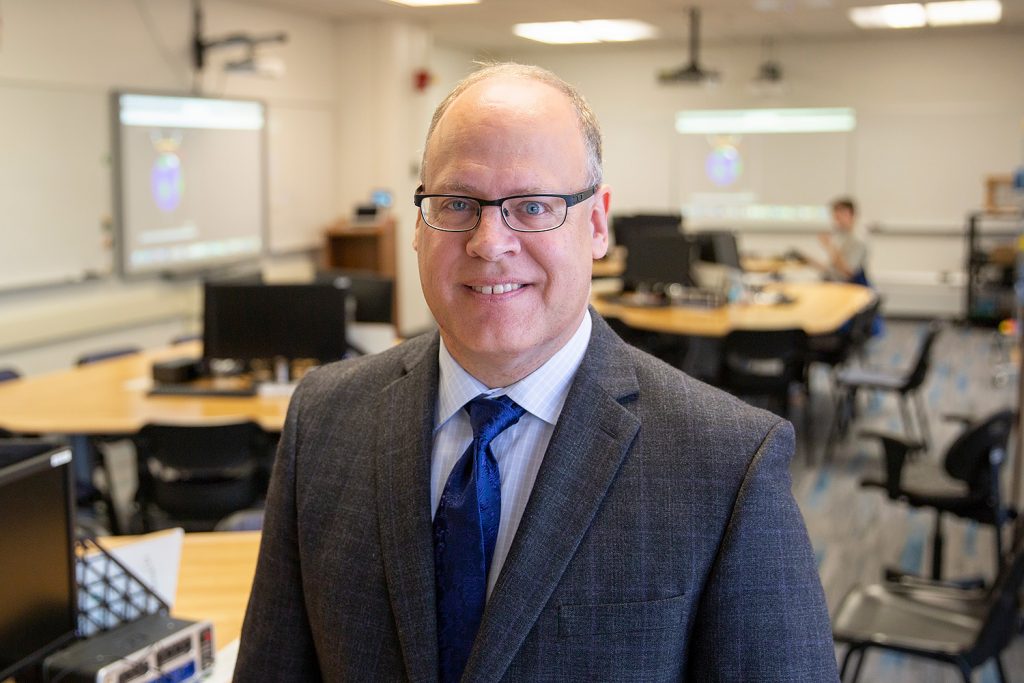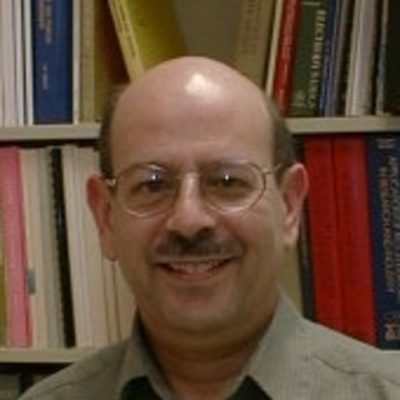
When Barrett Wells became head of the Department of Physics in 2018, he says his opinion of the department changed.
“It was such an interesting thing, to learn more about what all my colleagues were doing,” the condensed matter physicist says. “I always felt we had a good department but as I learned more details [on colleagues’ research], I thought, ‘Wow, we’re better than I thought we were.’”
Now as Wells, who goes by Barry, joins the College of Liberal Arts and Sciences as the new Associate Dean for Life and Physical Sciences, he expects he’ll experience that all over again.
“Of course, this will be different – broader, and much larger,” he notes. “But I’m looking forward to learning more broadly about all our science departments.”
Wells joined UConn in 1998, following positions at Boeing and Brookhaven National Laboratory. He became department head in 2018, where he met and worked with department heads across the CLAS Division of Life and Physical Sciences.
“Everybody’s grumbling about the same things, or they’re happy about the same things,” he jokes. “I’m hoping that sitting where I am, I can help keep the voices of the people in the departments centered in where we are going and what decisions we make.
“I want to get a clear understanding of what each unit believes their problems and strengths are, and the people involved.”
Wells will oversee the Division of Life and Physical Sciences, which comprises the Departments of Chemistry; Earth Sciences; Ecology and Evolutionary Biology; Geography; Marine Sciences; Molecular and Cell Biology; Mathematics; Physics; Physiology and Neurobiology; Psychological Sciences; Speech, Language, and Hearing Sciences; and Statistics.
“Barry is a thoughtful and experienced scientist and leader, and I’m very happy to have him,” says Ofer Harel, interim dean of the College. “His track record shows that he asks the right questions and really advocates for his faculty and staff.”
Among the unique challenges of the position, Wells says, is ensuring adequate space for laboratory research. He will work closely on these and other issues with Associate Dean for Research and Graduate Affairs Andrew Moiseff, who previously served in Wells’ role.
“Andy is a major part of the reason I decided to apply for this role,” says Wells. “He’s been wonderful to work with. It’s a little scary to try to live up to him.”
Wells says he wants to ensure people have access to resources for both interdisciplinary and disciplinary research. Research and teaching in the disciplines needs to be strong, he says, for interdisciplinary research to be successful.
As the University moves toward replacing its general education requirements – most of which are offered in CLAS – with a common curriculum, Wells anticipates that he and the other CLAS associate deans will work to ensure that the College continues to provide a diverse, liberal education to all UConn students.
“We all know we are trying to create and disseminate knowledge, and I’m looking forward to working with people who keep the core mission of the University in mind,” he says.
Inclusion is also very important to Wells, whose own home field of physics has traditionally lacked representation of women. Data also shows, he notes, that most women scientists have partners who are also scientists, which factors into where they end up making their academic home.
“People come from all over the world to work at UConn, and we have to make that a great choice,” he says. “We want to create situations that are really good for them.”
Although Wells says he has a steep learning curve to surmount, he has found the CLAS offices among the best to work with at the University. He hopes to contribute to the overall success of not just his division, but the College.
“My definition of success is that CLAS departments feel that they are running smoothly and that people are able to do their best work.”
 IMS is saddened to report the recent passing of Dr. Jeffrey Schweitzer, Professor in the department of Physics with an appointment in IMS. We are grateful to Dr. Peter Schweitzer (not related) for the following recap of Dr. Schweitzer’s background and tenure at UConn:
IMS is saddened to report the recent passing of Dr. Jeffrey Schweitzer, Professor in the department of Physics with an appointment in IMS. We are grateful to Dr. Peter Schweitzer (not related) for the following recap of Dr. Schweitzer’s background and tenure at UConn: